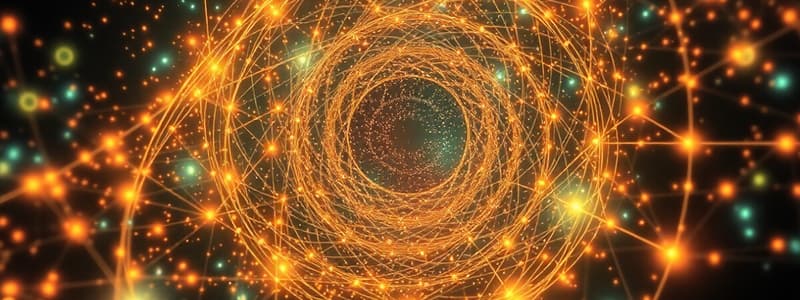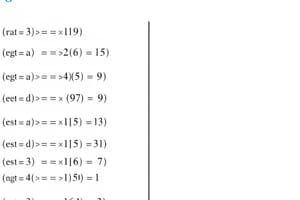Podcast
Questions and Answers
Which logic system does not recognize Peirce's law?
Which logic system does not recognize Peirce's law?
- Classical logic
- Intuitionistic logic (correct)
- Modal logic
- Temporal logic
What type of sets primarily concern discrete mathematics?
What type of sets primarily concern discrete mathematics?
- Infinite sets
- Uncountable sets
- Dense sets
- Countable sets (correct)
In which area of combinatorics do we focus on counting the number of distinct partitions?
In which area of combinatorics do we focus on counting the number of distinct partitions?
- Graph combinatorics
- Enumerative combinatorics (correct)
- Analytic combinatorics
- Algebraic combinatorics
What primarily distinguishes graph theory from general combinatorics?
What primarily distinguishes graph theory from general combinatorics?
What type of probability theory deals specifically with countable sample spaces?
What type of probability theory deals specifically with countable sample spaces?
What mathematical structure does analytic combinatorics primarily utilize?
What mathematical structure does analytic combinatorics primarily utilize?
Which of the following is not an application area of graph theory?
Which of the following is not an application area of graph theory?
Which of the following specifically describes a characteristic of discrete observations?
Which of the following specifically describes a characteristic of discrete observations?
Which of the following objects are considered discrete in discrete mathematics?
Which of the following objects are considered discrete in discrete mathematics?
What is a key focus area of theoretical computer science as related to discrete mathematics?
What is a key focus area of theoretical computer science as related to discrete mathematics?
What principle do we study in the context of computability within discrete mathematics?
What principle do we study in the context of computability within discrete mathematics?
In mathematical logic, what concept is primarily studied?
In mathematical logic, what concept is primarily studied?
Which area combines coding theory with the quantification of information?
Which area combines coding theory with the quantification of information?
Why is discrete math vital for understanding computer science programming fundamentals?
Why is discrete math vital for understanding computer science programming fundamentals?
Which of the following is NOT typically classified as a discrete structure in mathematics?
Which of the following is NOT typically classified as a discrete structure in mathematics?
What is closely linked to the capabilities of reliable and efficient data transmission?
What is closely linked to the capabilities of reliable and efficient data transmission?
What is the requirement for two matrices to be added together?
What is the requirement for two matrices to be added together?
What does the notation aij represent in a matrix A?
What does the notation aij represent in a matrix A?
What type of multiplication is performed when multiplying a matrix A by a scalar c?
What type of multiplication is performed when multiplying a matrix A by a scalar c?
Which operation requires the number of columns of the first matrix to equal the number of rows of the second matrix?
Which operation requires the number of columns of the first matrix to equal the number of rows of the second matrix?
When performing the subtraction of two matrices A and B, which formula is correct?
When performing the subtraction of two matrices A and B, which formula is correct?
In scalar multiplication, what happens to each element of the matrix A?
In scalar multiplication, what happens to each element of the matrix A?
Which of the following statements is true about matrix transposition?
Which of the following statements is true about matrix transposition?
What is the result of adding matrix A to itself?
What is the result of adding matrix A to itself?
Which property of scalar multiplication indicates that multiplying a matrix by a scalar zero results in the zero matrix?
Which property of scalar multiplication indicates that multiplying a matrix by a scalar zero results in the zero matrix?
In the multiplication of matrices A (m × n) and B (n × p), which of the following is necessarily true about the resulting matrix AB?
In the multiplication of matrices A (m × n) and B (n × p), which of the following is necessarily true about the resulting matrix AB?
Which expression shows the associative property of matrix multiplication correctly?
Which expression shows the associative property of matrix multiplication correctly?
Which property indicates that matrix multiplication is not commutative?
Which property indicates that matrix multiplication is not commutative?
What is the result of multiplying any matrix A by its identity matrix In?
What is the result of multiplying any matrix A by its identity matrix In?
To obtain the element aij in the product of two matrices A and B, which vectors are multiplied?
To obtain the element aij in the product of two matrices A and B, which vectors are multiplied?
Which operation is used to change rows into columns in a matrix?
Which operation is used to change rows into columns in a matrix?
If A is a matrix of order 2 × 3 and B is a matrix of order 3 × 2, what will be the order of the resulting matrix AB?
If A is a matrix of order 2 × 3 and B is a matrix of order 3 × 2, what will be the order of the resulting matrix AB?
What does Boolean algebra limit its quantities to?
What does Boolean algebra limit its quantities to?
Which statement accurately represents the outcome of '1 + 1' in Boolean algebra?
Which statement accurately represents the outcome of '1 + 1' in Boolean algebra?
What mathematical operation in Boolean algebra corresponds to the logical function of an OR gate?
What mathematical operation in Boolean algebra corresponds to the logical function of an OR gate?
Which of the following concepts does NOT exist in Boolean mathematics?
Which of the following concepts does NOT exist in Boolean mathematics?
What is the primary reason the results of Boolean algebra may seem nonsensical at first?
What is the primary reason the results of Boolean algebra may seem nonsensical at first?
How does Boolean algebra handle the arithmetic operation of addition differently compared to real numbers?
How does Boolean algebra handle the arithmetic operation of addition differently compared to real numbers?
In Boolean algebra, how is the value '2' factored into arithmetic operations?
In Boolean algebra, how is the value '2' factored into arithmetic operations?
What must be understood about the philosophical principles behind Boolean algebra?
What must be understood about the philosophical principles behind Boolean algebra?
Flashcards are hidden until you start studying
Study Notes
Discrete Structures
- Discrete mathematics is a branch of mathematics that deals with distinct or separate objects, like integers, sets, and propositions.
Theoretical Computer Science
- Theoretical computer science is a field that relies heavily on logic and graph theory.
- It helps analyze algorithms and their complexity (time taken to execute).
- The study of computability investigates what can be computed based on principles of formal language theory and automata theory.
Information Theory
- Information theory quantifies information by studying coding and data transmission.
- It focuses on designing efficient and reliable data storage and transmission methods.
Mathematical Logic
- Also known as formal logic, it analyzes principles of reasoning and valid inferences.
- Studies concepts like consistency, completeness, and soundness of logical systems.
- Explores mathematical proofs.
Set Theory
- Studies sets which are collections of objects, like prime numbers or colours.
- Examines relationships between sets, including partially ordered sets.
- Focuses on countable sets, including finite sets.
Combinatorics
- Explores ways to arrange and combine discrete structures.
- Enumerative combinatorics focuses on counting the number of combinatorial objects, such as combinations, permutations, and partitions.
- Analytic combinatorics uses tools from probability theory and complex analysis to study the enumeration of combinatorial structures.
Graph Theory
- A part of combinatorics that analyzes networks and graphs, with applications in various fields.
- Graphs represent relationships and structures found in both natural and man-made systems.
- Allows for the modelling and analysis of dynamics in social, biological, and physical systems.
Discrete Probability Theory
- Deals with events occurring in countable sample spaces.
- Useful for analyzing situations involving discrete events, like counting the number of birds in a flock.
- In contrast to continuous probability distributions, discrete probability doesn't deal with real numbers but with countable values.
Matrices
- Matrices are represented by uppercase letters.
- Elements in a matrix are denoted by lower case letters with two subscripts indicating their position in the row and column.
- For example, 'aij' represents the element in the ith row and jth column of matrix A.
Matrix Operations
- Matrices can undergo various operations like addition, subtraction, multiplication, and transposition.
Addition of Matrices
- Addition is only possible for matrices with the same number of rows and columns.
- Corresponding elements of the matrices are added together.
Subtraction of Matrices
- Subtraction is also only possible for matrices with the same number of rows and columns.
- Corresponding elements of the matrices are subtracted.
Scalar Multiplication
- Multiplying a matrix by a scalar 'c' involves multiplying each element of the matrix by 'c'.
Multiplication of Matrices
- Matrix multiplication only works if the number of columns in the first matrix is equal to the number of rows in the second matrix.
- The product of two matrices involves multiplying each row vector of the first matrix with each column vector of the second matrix.
Transpose of Matrices
- The transpose of a matrix is obtained by swapping rows for columns and vice versa.
Boolean Algebra
- Boolean algebra is a system of algebra that deals with only two possible values: 1 (true) and 0 (false).
- Introduced by George Boole in the 19th century as a way to simplify and analyze logical reasoning.
- Boolean algebra is crucial for digital circuits and computer science.
Boolean Arithmetic
- In Boolean arithmetic, the addition operation is represented as the logical "OR" operation.
- The sum of 1 + 1 is equal to 1 in Boolean algebra.
- Subtraction is not defined in Boolean algebra.
- The addition and subtraction of Boolean values follow the same logic as the truth table for the OR gate.
Studying That Suits You
Use AI to generate personalized quizzes and flashcards to suit your learning preferences.




